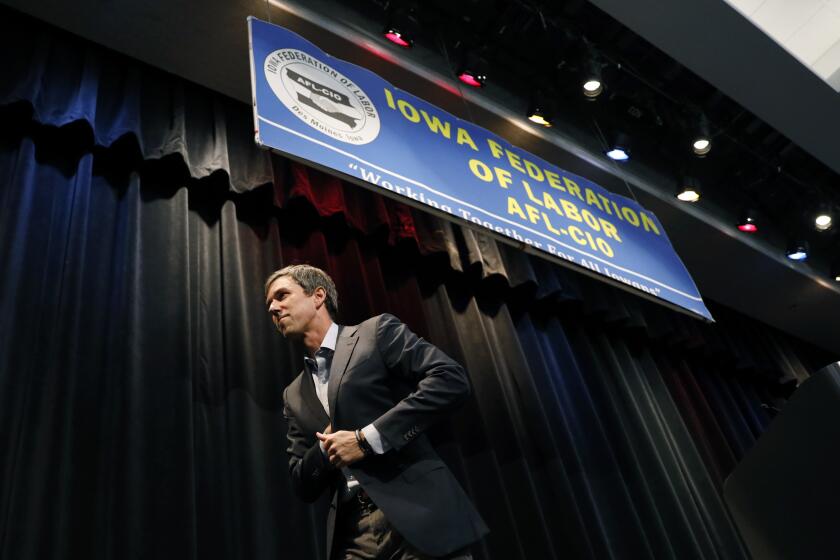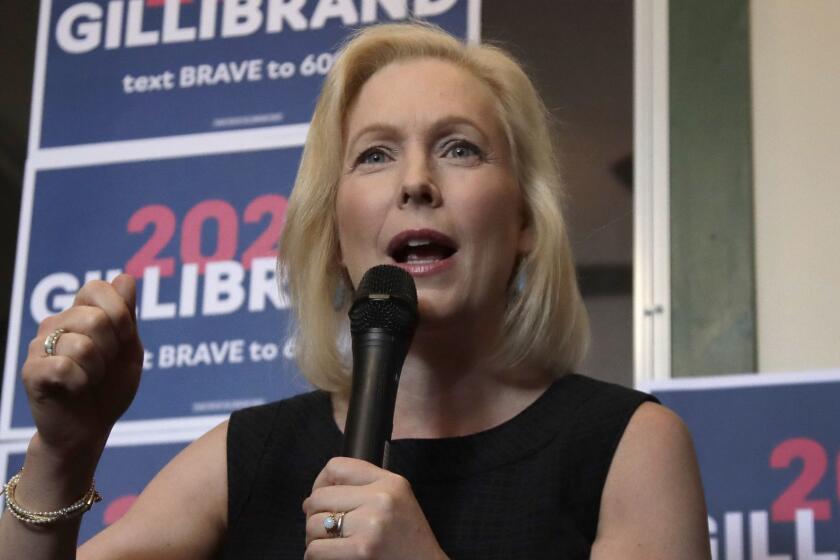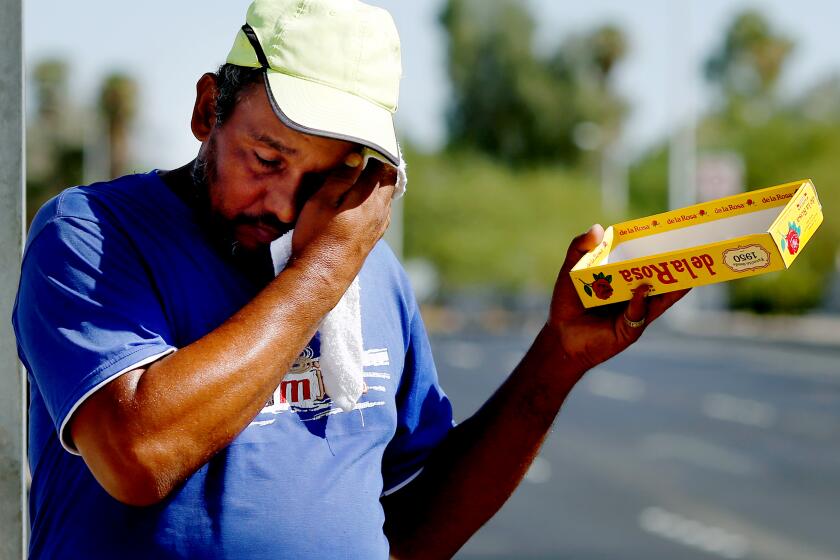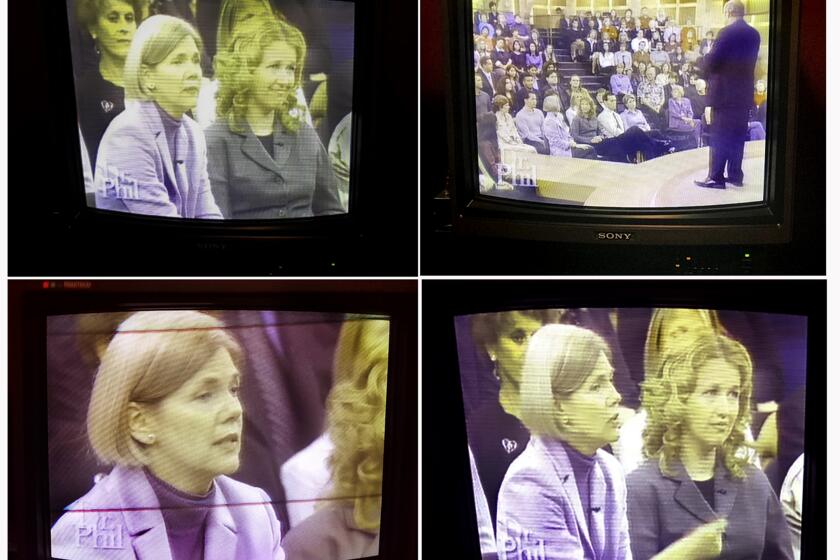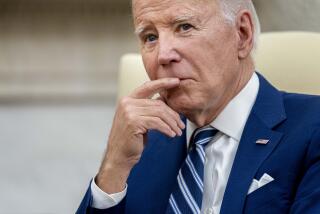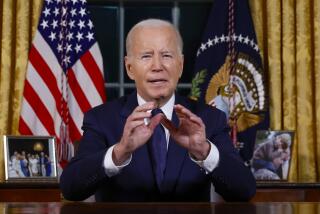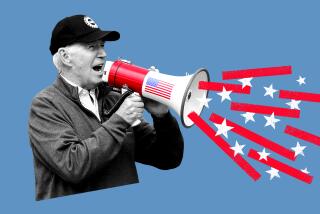The debate Democrats have waited for: Joe Biden vs. Elizabeth Warren
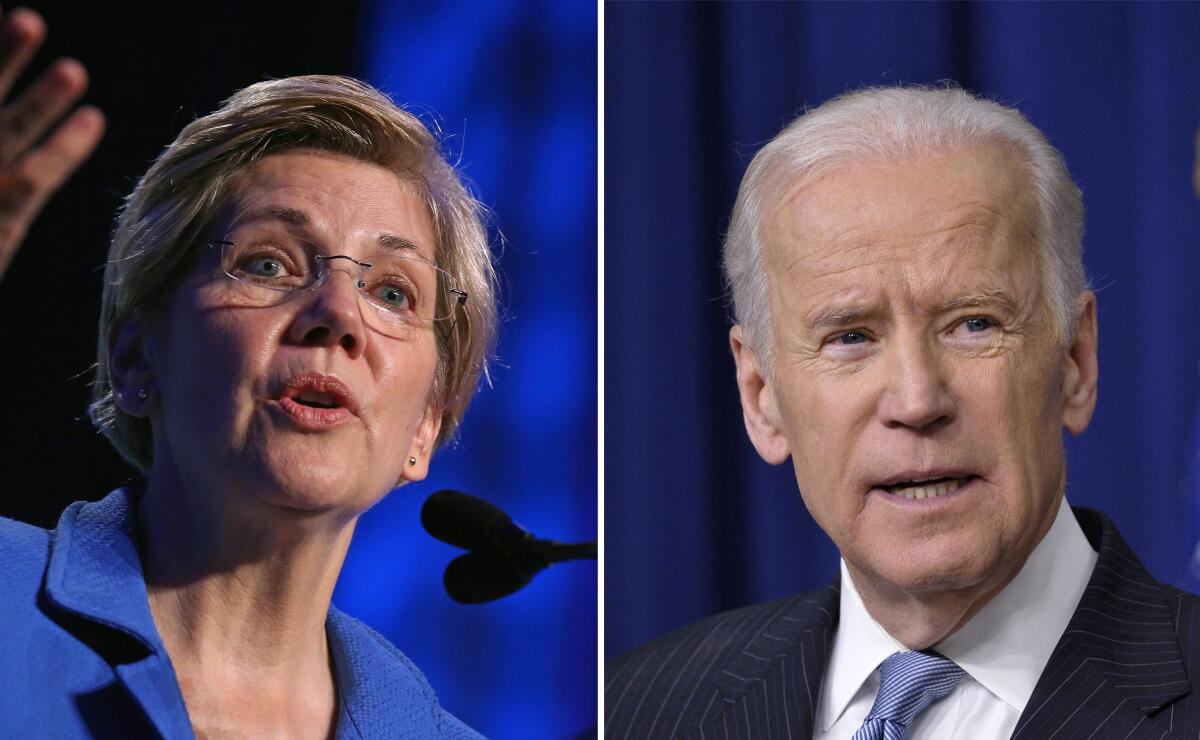
At last Democratic voters will get the face-off many have been waiting for: Joe Biden and Elizabeth Warren on the same presidential debate stage for the first time.
With that, a fork in the road is coming into view for the Democratic Party.
Only 10 candidates qualified for the Democrats’ September debate by the Wednesday deadline. ABC, the sponsoring network for the event, had already announced that would mean one night of debating, Sept. 12.
Two top candidates — the former vice president who is the front-runner, and the Massachusetts senator whose campaign has been gathering momentum — personify big choices Democrats face about what they stand for and how much change will be needed if they oust President Trump.
Warren wants to shake things up, Biden wants to calm things down. She calls for tectonic changes in the U.S. economy and politics. He proposes more incremental reforms.
For many, Biden is the candidate of the head, with voters drawn not by passion, but by the belief he is their safest bet to beat Trump. For others, Warren is the candidate of the heart, drawing thousands of chanting fans to rallies who shrug off doubts about her electability.
With Warren rising steadily in polls to gain a place in the top tier of candidates — closing in on Biden and her rival on the party’s left, Sen. Bernie Sanders of Vermont — many Democrats foresee a Warren-Biden collision at the end of the primary election trail.
In the aftermath of the El Paso shootings, the 2020 Democratic presidential hopeful vows to follow a path less traveled as he crusades against President Trump and calls for stiffer gun laws and a more compassionate immigration policy.
“Do Democrats want someone as radical — radical in a good sense — as Franklin Delano Roosevelt proposing fundamental change, or someone like Biden proposing normalcy or continuity?” asked Robert Kuttner, progressive author of a forthcoming book “The Stakes: 2020 and the Survival of American Democracy.”
Elaine Kamarck, a member of the Democratic National Committee who has not endorsed any candidate, said she believed Warren “is the one person in the race who could overtake Biden. I could see it going down to a two-person race.”
Democrats are a long way from that point. Biden still leads by double-digit margins in most polls. And it is hard to see how Warren can succeed unless Sanders, who still ranks second in most polls, fades.
But getting Biden and Warren on the same stage could help voters like Gretchen Peterson, a retiree from Altoona, Iowa, who is a fan of Biden’s because of his years as Barack Obama’s vice president but finds Warren’s energy increasingly appealing.
“If they are on the debate stage together, I’ll be watching,” Peterson said.
When the DNC standards were more lenient for the June and July debates, 20 candidates qualified and were split into two debates of 10 candidates each. In neither of the first two rounds did Biden and Warren get placed on the same stage.
Now there are 20: Sen. Kirsten Gillibrand of New York drops out of the 2020 Democratic presidential race.
For the September and October debates, the DNC toughened its qualifying requirements. That left all but 10 on the outside looking in. Beyond Biden, Warren and Sanders, Sens. Kamala Harris, Amy Klobuchar and Cory Booker qualified, as did South Bend, Ind., Mayor Pete Buttigieg, former Housing secretary Julián Castro, former Rep. Beto O’Rourke and Andrew Yang, the tech entrepreneur.
Among the non-qualifiers, Tom Steyer, the billionaire political activist, came the closest. Under the DNC rules, he would make the October debate if one more qualifying poll shows him with at least 2% support.
ABC News on Thursday announced that the September debate, to be held at Texas Southern University in Houston, would run for three hours, beginning at 5 p.m. PDT. Candidates will be allowed to make an opening statement and will be given 75 seconds to answer questions from moderators and 45 seconds for rebuttals.
As for Warren and Biden, despite their glaring differences, the two have some similarities: Both emphasize working-class roots, his in Pennsylvania, hers in Oklahoma. Both owe their prominence in part to the Obama administration, he as vice president, she as an advisor called in to set up the Consumer Financial Protection Bureau. Both are old enough — he 76, she 70 — that neither would have had much chance of running for president had it not been for Hillary Clinton’s defeat in 2016.
But they bring to the 2020 campaign very different worldviews and goals: Warren is aiming not just to beat Trump but to rid the U.S. of structural inequities that she believes contributed to Trump’s rise. Biden is aiming to focus Democrats’ energy on getting rid of Trump, calling for more incremental policy changes and a return to the normality of the Obama era.
Warren believes voters are broadly dissatisfied with the status quo; Biden that they are mostly terrified of another Trump term.
Trump administration appears to violate law in forcing asylum seekers back to Mexico, officials warn
The L.A. Times finds the Trump administration appears to be violating U.S. law in implementing the Remain in Mexico policy, officials and lawyers warn.
A July Wall Street Journal/NBC News poll found the party split over how much change is needed.
The poll found 54% of Democratic primary voters said they preferred a nominee who proposes large-scale policies that cost more and might be harder to pass; Warren was their favorite candidate.
About 41% preferred someone who favors smaller-scale changes that would be easier to enact; Biden was their top choice.
In a typical split between the two, both propose big changes in healthcare. But Warren supports replacing the current system with Medicare for all; Biden wants to improve on the Obama-era health reform, the Affordable Care Act.
The two have not been taking direct shots at each other, and it’s not clear they will do so on the debate stage together.
“Each one of them realizes that a shootout like that only helps Trump,” said former Rep. Barney Frank (D-Mass.).
Asked about debating Warren, Biden said Wednesday, “I’m just going to be me, and she’ll be her, and we’ll let people make their judgments. I have great respect for her.”
Still, the two have been taking veiled swipes that foreshadow the collision to come.
In a speech to the Democratic National Committee in San Francisco last week, Warren’s target was unmistakable:
“Some Democrats in Washington believe the only way forward is to make change incrementally, a few tweaks here and some nudges there,” she said. “No. This is a time of crisis…. I’m here with a message for Democrats: This is not the time for small ideas.”
In his latest television ad, Biden criticized unnamed backers of “Medicare for all.”
“Obamacare is personal to me,” he said in the ad. “When I see the president try to tear it down and others propose to replace it and start over, that’s personal to me. We have to build on what we did.”
Some of their backers and surrogates are more blunt.
“He is running the Warren Harding campaign and offering a return to normalcy, while she is offering a vision of a better America,” said Adam Jentleson, a Warren supporter who was an advisor to former Senate Democratic leader Harry Reid. “He’s saying we should go back to a time when you liked the way things were. She is saying things could be better.”
Biden’s team argues that debates about differences of policy and style are a luxury for a party that should be single-minded in his focus on beating Trump.
“If we get distracted as a party and start thinking about policy issues in the abstract and forget what this is all about, we’re going to be giving Donald Trump another four years,” said Dick Harpootlian, a South Carolina state senator who is a longtime Biden backer.
Warren would risk the loss of crucial Midwestern states where Trump picked up swing voters to win in 2016, he argued. “Will they vote for someone who has a career as a Harvard professor, a Massachusetts senator representing the liberal wing of the party?”
The two also have campaign styles that couldn’t be more different.
Elizabeth Warren entered politics after honing her skills on “Dr. Phil,” a staple of daytime confessional TV.
Warren’s stump speech is disciplined and on message; her superpower is the ability to explain issues in simple terms; some critics find her style pedantic. Biden is a compassion virtuoso, his speeches more conversational and rambling. That style has famously gotten him in trouble with misstatements and gaffes.
After Warren speaks, her campaign has perfected a photo-line regimen that works with assembly-line precision. That has allowed tens of thousands of people to get pictures that the campaign hopes will be posted to social media. The scene at a Biden event is one of genial chaos: Biden allows himself to be swarmed by followers after his speeches, taking selfies as he is followed by a crowd that moves with him, amoeba-style.
Voters are looking to the debates to sort out those strengths and weaknesses. Gretchen Peterson of Iowa says she was impressed with Warren’s policy plans and her ability to draw 15,000 people to her Seattle rally but hopes for “more clarification on her plan for black voters.”
On the other hand, Peterson said, Biden needs to find ways to appeal to more young voters and to hone his speaking style. “His gaffes don’t help,” she said.
More to Read
Get the L.A. Times Politics newsletter
Deeply reported insights into legislation, politics and policy from Sacramento, Washington and beyond. In your inbox three times per week.
You may occasionally receive promotional content from the Los Angeles Times.
